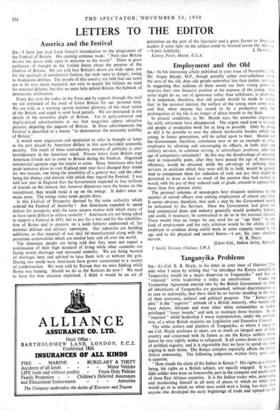Employment and the Old
SIR,—In his interesting article published in your issue of November 1 71h, Mr. Angus Maude, M.P., though possibly rather over-solicitous about the care of the old, does old people somewhat less than justice, perhaps, in suggesting that millions of them would use their voting power to improve their own financial position at the expense of the young. That some might do so, out of ignorance rather than selfishness, is probable. It is important, therefore, that old people should be made to realise that, in the national interest, the welfare of the young must come first, and that, when anyone has ceased to be a productive unit, the prolongation of his life is no longer of direct benefit to the State.
In present conditions, as Mr. Maude says, the economic arguments for early retirement have disappeared. The urgent need now is to keep
old people at productive work for as long as possible. Only by doing so will it be possible to ease the almost intolerable burden which the young, in future generations, will be called upon to bear. Should not the Government, therefore, commence now to set an example to other employers by allowing and encouraging its officers, in both civil and military services, to continue serving, in subordinate positions, after the age of compulsory retirement? In this way the disadvantage of retaining men in responsible posts, after they have passed the age of maximum efficiency, would be obviated, while the advantage of utilising their services, in positions which they were still fit to hold, would be gained. And to compensate them for reduction of rank and pay they might be permitted to draw at least as much of the pension they had earned as would, with the pay of their reduced rank or grade, amount to appreciably more than that pension alone.
The personal columns of newspapers bear eloquent testimony to the
number of retired officers now seeking employment of almost any kind. It seems obvious, therefore, that such a step by the Government would be welcomed by the Services. Once the Government had given the lead commercial firms and industry generally would probably follow; and could, if necessary, be constrained to do so in the national interest. There would then no longer be any need for an "age limit" in any kind of employment and the only criterion would be the ability of the employee to continue doing useful work in some capacity suited to his age and to his physical and mental fitness.—I am, Sir, your obedient
(Lieut.-CoL, Indian Army, Retired).
5 Smith Terrace, Chelsea. S. W.3.














































































 Previous page
Previous page